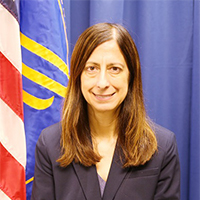In August 2023, Mary L. Smith, a tribal citizen of the Cherokee Nation, became the first Native American to lead the American Bar Association (ABA), the largest voluntary association of lawyers in the world. She was installed as the president of the ABA at the organization's convention in Denver. On Monday, Smith released the following statement to observe the National Day of Awarenessfor Missing and Murdered Indigenous People (MMIP).

The American Bar Association joins with tribal nations and the country in recognizing the National Day of Awareness for Missing and Murdered Indigenous People (MMIP). We express our deepest condolences to the families of missing Indigenous persons and stand strong in our commitment to address this crisis.
For too long, justice has been elusive for many missing, murdered indigenous people. It is a sobering and dark reality that we must work to simply acknowledge the disproportionate and devastating rates of violence that Indigenous people experience. Such disproportionality stems from multiple factors, including the vestiges of settler colonialism that has calcified into normalized violence, accompanied by, in too many cases, a critically neglectful and a disengaged law enforcement and justice response.
The crisis is one of countless missing and murdered Indigenous women and relatives. Many indigenous families have experienced the pain of having a relative, particularly young women, girls, LGBTQ and two-spirit people, disappear with the added trauma that the justice system too often turns a blind eye to their plight. On some reservations, Indigenous women are murdered at more than 10 times the national average. American Indians and Alaska Natives are 2.5 times as likely to experience violent crimes—and at least 2 times more likely to experience rape or sexual assault crimes—compared to all other races. More than 4 in 5 American Indian and Alaska Native women and men have experienced violence in their lifetime. Gender based violence, including sexual assault and physical violence, is committed up to 85% of Indigenous Two Spirit individuals.
The American Bar Association has been working diligently for over a decade to help minimize this violence and close the legal system gaps that allow it to take place. Efforts have focused on increasing access to justice and safety for Indigenous people, including victims of gender-based violence. For example, in 2020, the ABA passed two resolutions specifically addressing MMIP and calling for the support of pieces of related national legislation – Savannah’s Act and the Not Invisible Act – that are now law. The ABA has similarly passed resolutions in support of amendments supporting Tribal court sovereignty in the Violence Against Women Act. Most recently, the Association promulgated policy increasing access to the AMBER Alert system for Alaska Natives and American Indians.
Despite these efforts and the efforts of many advocates across the country, the scourge of MMIP remains a reality in many tribal communities. Today, as we acknowledge the National Day of Awareness for MMIP, we stand shoulder-to-shoulder in grief with indigenous families and remain steadfast in our commitment to end this crisis.
The ABA is the largest voluntary association of lawyers in the world. As the national voice of the legal profession, the ABA works to improve the administration of justice, promotes programs that assist lawyers and judges in their work, accredits law schools, provides continuing legal education, and works to build public understanding around the world of the importance of the rule of law.
More Stories Like This
Native News Weekly (August 25, 2024): D.C. BriefsUS Presidents in Their Own Words Concerning American Indians
Federal Judge Orders ICE to Halt Use of Pepper Spray, Arrests of Peaceful Protesters in Twin Cities
Tunica-Biloxi Cultural Leader John D. Barbry Walks On
Next on Native Bidaské: Federal ICE Activity in Minneapolis: Ruth Buffalo’s Perspective
Help us defend tribal sovereignty.
At Native News Online, our mission is rooted in telling the stories that strengthen sovereignty and uplift Indigenous voices — not just at year’s end, but every single day.
Because of your generosity last year, we were able to keep our reporters on the ground in tribal communities, at national gatherings and in the halls of Congress — covering the issues that matter most to Indian Country: sovereignty, culture, education, health and economic opportunity.
That support sustained us through a tough year in 2025. Now, as we look to the year ahead, we need your help right now to ensure warrior journalism remains strong — reporting that defends tribal sovereignty, amplifies Native truth, and holds power accountable.
 The stakes couldn't be higher. Your support keeps Native voices heard, Native stories told and Native sovereignty defended.
The stakes couldn't be higher. Your support keeps Native voices heard, Native stories told and Native sovereignty defended.
Stand with Warrior Journalism today.
Levi Rickert (Potawatomi), Editor & Publisher


